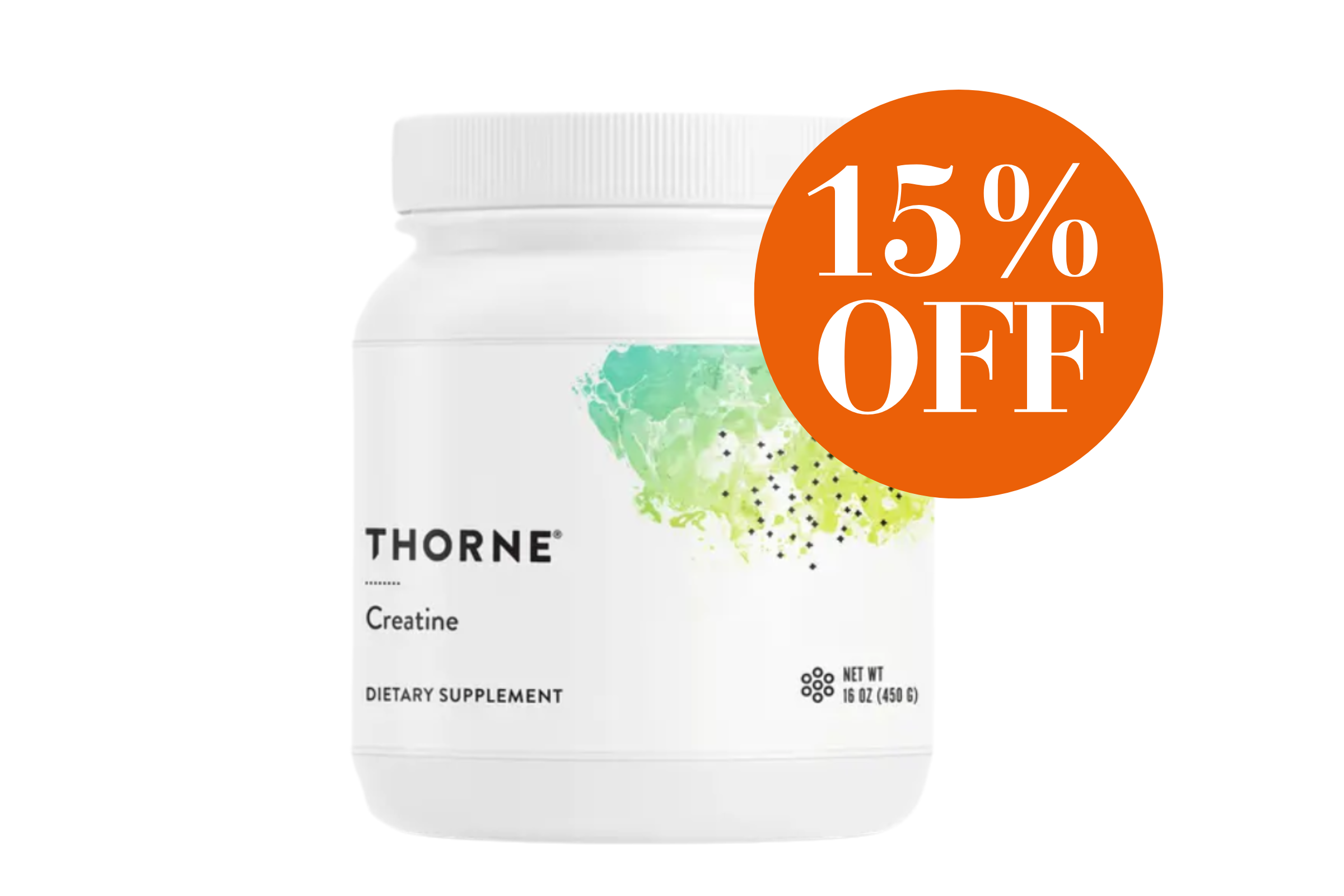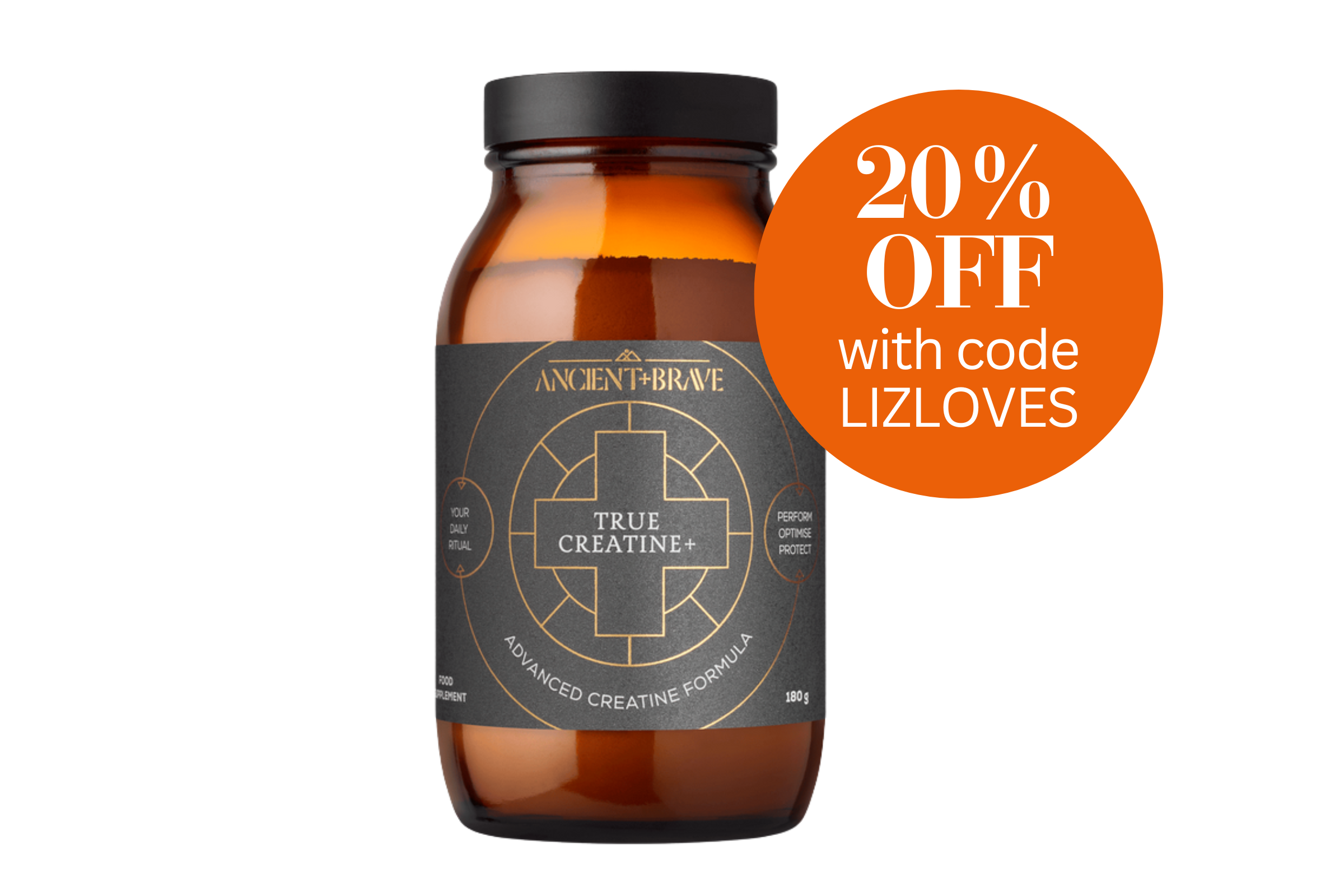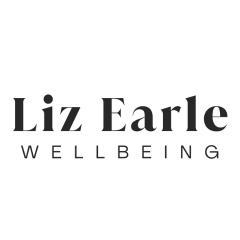Creatine – what is it and what are the benefits for midlife women?

What does creatine really do? There are many reports of this so-called slimming and strength booster – but what stacks up?
Creatine is associated with improving performance and strength in the gym. It helps our bodies to produce more energy rapidly, but it seems to have a host of other benefits for all ages too.
Research shows that creatine supplements can be a good way of countering the loss of muscle mass that naturally occurs as we get older. In fact, our bodies may even be better at absorbing it later in life.
What is creatine?
Creatine is a molecule found naturally in our muscle cells. It provides energy when we do high intensity exercise. It can also be found in our kidneys and liver too where it’s made from the amino acids in protein. Its food sources are all rich in proteins, such as red meats, fish and even dairy. Creatine can also be made synthetically and sold as supplements, which are becoming increasingly popular to aid exercise and muscle growth.
Although creatine supplements are often taken to help increase muscle mass and reduce fatigue while doing intense physical exercise, it tends to be most effective for strengthening muscles and helping with short-term bursts of exercise rather than aerobic workouts. Not just for gym bunnies, increasing muscle mass can help those of us who feel like our muscles are becoming weaker as we age. Creatine can make our muscles feel more robust. This in turn helps us exercise and makes us even stronger!
It’s also worth noting that creatine isn’t a replacement for protein, which we also need to help recovery after exercise.
What does it do?
Creatine can improve our muscles in a number of ways. Primarily it helps to increase our limits when we exercise. A compound called ATP is the simplest form of energy found in our body’s cells. It doesn’t last long before it needs replacing – that’s why we can’t do very intense exercise for more than a few seconds at a time.
Creatine helps our cells to make more ATP and boost the energy in our cells. This means we feel stronger for longer. As we age, energy can drop, so oral creatine supplements can help us better prepare for both gentle and more strenuous exercise.
More importantly for ageing muscles is how creatine can help muscle maintenance and growth. Creatine can help improve cell hydration in our muscles. This makes them bigger and may play a role in their long-term growth. It also can help stop the breakdown of some proteins in our muscles, which can keep us strong.
What are the benefits?
One of creatine’s primary benefits is giving our muscles more energy when we’re doing high intensity workouts. But you don’t have to be doing intense exercise for it to make a difference. It can help open new cellular pathways that help us create new muscle mass over time.
Creatine can also slow the loss of bone mass as we age. This can help you feel stronger and more able to exercise. By helping our bones and muscles, creatine can protect against bodily weakening as we get older.
There is also some evidence to show that creatine may improve our brain function. It works by maintaining cell function and reducing cell death, treating and preventing neurological diseases, though this isn’t conclusive in human trials yet.
How to take it
Creatine comes in two major forms, powder and capsules. When taken in pill form, the shell of the capsule must be digested by the body before it can be used. In this sense, powder is better absorbed by the body meaning it can do its job faster. On the other hand, powder is less convenient if you’re heading out to the gym. There is limited evidence that favours one way of taking creatine over another. It mostly comes down to which best suits your lifestyle.
Creatine is more efficient when insulin levels are raised. It’s recommended that you take it at the same time as you might have carbohydrates or sugars. You could have your capsules with a meal, for example, or mix your powder with a small amount of fruit juice.
Creatine and ageing
We naturally lose some of our muscle mass as we age – by the time we’re in our 60s we can have lost as much as 40% of our strength. This in turn makes keeping in shape harder and increases our risk of falls and fractures. This age-related muscle loss is known as sarcopenia. It can cause weakness and loss of stamina, as well as decreasing bone strength.
Because creatine is mostly stored in skeletal muscle tissue, we have less of it naturally as we lose muscle. Important research has found that creatine supplements can replace it and help combat the causes and symptoms of our bodies changing in this way. Research shows that creatine has anti-sarcopenic effects on ageing bodies and reduced their risk of falls and the associated injuries like fractures. By boosting our strength and muscles, creatine can contribute to our leg strength and subsequently our stability too.
One study found that, when combined with resistance training, creatine increased lean tissue mass and improved leg strength and endurance in men over the age of 70.
With regular exercise, it seems that it can be effective not only for maintaining muscle mass, but even for increasing it.
If you think you may be affected by sarcopenia, it might be worth talking to a medical professional about whether creatine could be a good additional supplement to take on a daily basis.
Creatine supplements, loved by Liz
Thorne Creatine

Designed to boost lean muscle mass, endurance, cellular energy, and brain function. Follow this link to save 15% off your order.
Ancient+Brave True Creatine

An expertly formulated blend enhanced with taurine, Vitamin D, and Magnesium to elevate energy, muscles, bone, and cognitive health. Save 20% with the code LIZLOVES.
Read more features like this
- Testosterone and menopause – what you need to know
- Liz explains all about cryotherapy
- Poor circulation and how to improve it
Please note, on some occasions, we earn revenue if you click the links and buy the products, but we never allow this to bias our coverage and always honestly review. For more information please read our Affiliate Policy.




